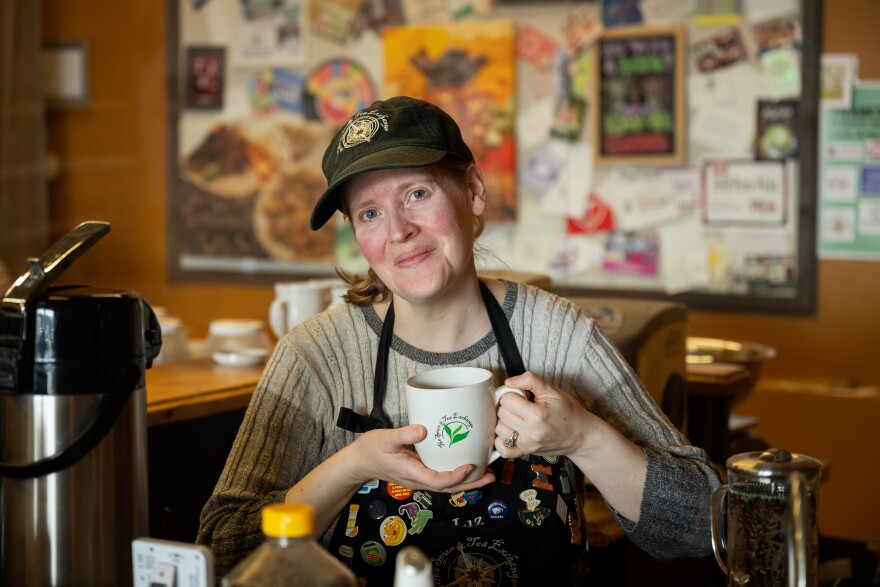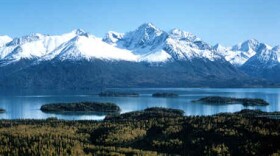The Spice and Tea Exchange in South Anchorage imports teas, spices, salts and sugars from nearly 60 countries.
Liz Eldridge has owned the shop for nine years. She started preparing for tariffs in January by bulking up on the store’s most popular items and products from countries at high risk for tariffs, including China. Eldridge said it’s been hard to compete with larger companies that are trying to do the same thing.
“The demand has already skyrocketed," she said. “So that price has already been driven up, regardless of what tariff may be imposed on it.”
The store was able to secure a three month supply of vulnerable items they can’t source elsewhere, which has allowed them to limit the price hike for customers, for now. But between tariffs and lack of availability, Eldridge said the prices she’s charging for impacted items will rise about 45% in May.

Imports make her business possible, she said.
“We have to continue to be able to source tea. We can switch countries of origin, but even if we're switching from something that's hit by 80% (or) 100% tariffs, it's still 10%, it's still 20% sometimes,” she said.
The Spice and Tea Exchange is one of a few stores in the city that always has a selection of culinary botanicals, and Eldridge’s shop is the brains behind the seasoning blends at over 200 eateries in the state.
“I tend to think of us as being part of a really great food web here in the middle of Alaska,” she said. “Along with other producers, from meat to vegetables, you know, kind of helping to keep that wheel spinning.”
Tariffs from the Trump administration have changed a lot over the last few weeks and months, and Alaska entrepreneurs say they’re already hurting their small businesses.
That was a common theme in a survey from the state’s Small Business Development Center (SBDC) sent out in April. The center’s executive director, Jon Bittner, said the impacts on small businesses from tariffs will be far reaching.
“I think restaurants are going to be particularly hard hit because the margins are so tight, and any business that relies on federal funding or federal contracts,” Bittner said. “There's a lot of different hits coming to the business community right now, on a lot of different levels.”
About 100 small businesses have completed the survey so far. Some business owners that responded, Bittner said, mentioned they support the Trump administration’s policies even though tariffs hurt their bottom line.
Bittner said a majority said they were uncertain about the future and were worried about increased costs.
“There's very few businesses out there that thrive in chaos,” he said. “They require some kind of stability to plan for the future. If you don't even know what your products or services are going to cost three or six months down the line, it's impossible to do advertising. It's impossible to find clients.” Bittner said over 70% of small businesses with suppliers said their costs increased as a result of tariffs.
Alaska has a strong small business industry. More than 75,000 small businesses employed more than half the state's workforce in 2024, according to data from the Small Business Administration. Nationally, a group of small businesses are suing Trump, saying his tariffs are illegal and are likely to damage the global economy.
Even businesses that manufacture in Alaska aren’t necessarily celebrating the tariffs.

Ermine Skate is the only Nordic skate on the market manufactured in the United States, according to owner Paxson Woelber.
“You'd think that we'd be the very kind of company that would be helped by having tariffs on imported goods, and the reality is a lot more complicated,” Woelber said.
Everything from the skate’s ceramic coating to sharpening is done with manufacturers in Southcentral. But, like most skates, they’re made with steel and aluminium, some of which the nation imports, and are subject to a 25% tariff.
He said manufacturing is harder in Alaska because it’s more expensive, and can be difficult to find manufacturing partners. On the other hand, it allows him to test his skates in the elements they’re made for.

Several countries have joined a movement to boycott American goods over Trump’s tariff policy. For businesses like Ermine that have an international customer base, that’s bad news.
“Pretty much immediately after the United States started threatening Canadian sovereignty, I got one very terse email, that just said, cancel everything, you know, don't talk to me again, basically. I respect it, I refunded the order,” he said. “I don't think that's very productive for American businesses that are trying to manufacture and export to the rest of the world.”
Like The Spice and Tea Exchange, Woelber said the outdoor industry relies on importing products from around the world. Ermine also sells outdoor safety equipment, and their manufacturing equipment is made overseas.
“Often you're going to be kind of casting a very wide net all around the world for goods and machinery,” he said.
Revelate Designs, an Alaska-based bikepacking gear company, knows what it’s like to do business overseas. About half of their products are made in Seattle, the rest in Asia.
Owner Eric Parsons said that manufacturing outside of the U.S. gives the company flexibility to adapt to the industry’s changing demands and ramp up his manufacturing volume. He said the state of the art technology used for fabric welding, which uses heat to make leak-proof seams, is in China, and is used to construct the company’s waterproof bike bags.

Right now, Revelate has an order in China worth $50,000– and Parsons said it’s subject to tariffs totaling around 200%.
“That was placed before any of this happened, back in January, and we're going to be liable for that,” Parsons said. “We're trying to basically unload it to our international dealers.”
Selling to international dealers means the company will likely have to short wholesale orders to retailers, including big names like REI. High tariff costs, he said, could also eliminate the company’s ability to sell wholesale.
It’ll be the company’s last order from China under current trade conditions. Orders from China will be moved to Cambodia, Parsons said, and they already do some manufacturing in Vietnam.
But in early April, Trump announced whopping “reciprocal tariffs” on those countries of 49% and 46% respectively. Those tariffs have been paused through early July, but not knowing what’ll happen after then makes it hard for Parsons to make plans for his business.
When he saw those high tariffs, Parsons said his heart sank.
“I just despaired, this wave of, I would say, panic and, like, anger swept through me,” he said. “I was just like, ‘why are you destroying our business?’”
Revelate has multiple projects in the works that don’t have a viable supply chain anymore.
“We're trying to still move forward on plans and products that we're bringing out, and kind of crossing our fingers we can get stuff shipped before the 90 days is through. But after that, it's impossible to know,” he said.







